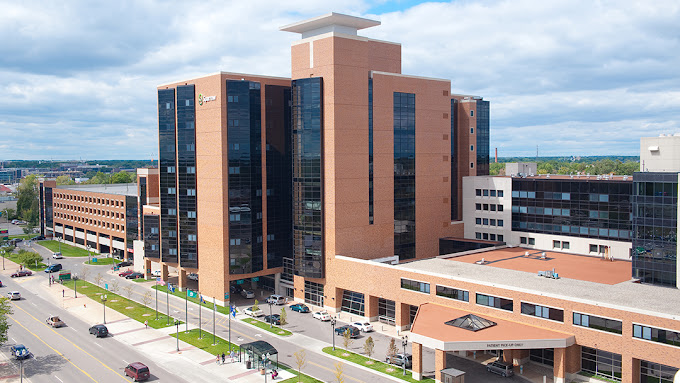Rotations
The University of Michigan Health-Sparrow/MSU Emergency Medicine Residency is a 3-year program that provides you with a unique clinical experience and offers a wide range of electives such as ENT, forensic pathology, radiology, and much more. Check out the curriculum for each PGY level below to learn more! The curriculum helps prepare you to go into a fellowship or practice.
-
PGY 1
-
Orientation/Emergency Medicine
8 weeks
Emergency Medicine
12 weeks
Cardiology
2 weeks
Sparrow ICU Jr.
12 weeks
Obstetrics
2 weeks
Elective
1 week
EMS
1 week
Pediatric EM
4 weeks
Internal Medicine
4 weeks
Anesthesia
2 weeks
Stroke
2 weeks
Vacation
4 weeks
-
PGY 2
-
Trauma Surgery
3 weeks
Sparrow ICU Jr.
4 weeks
PICU
4 weeks
Emergency Medicine
32 weeks (1 week of Emergency Medicine Ultrasound) 4 weeks of possible rural EM
PEDs Elective/Sedation
4 weeks (Peds elective includes Peds EM, Peds, Outpatient, Peds Inpatient)
Elective
2 weeks
Vacation
4 weeks
-
PGY 3
-
Emergency Medicine
40 weeks
Rural Emergency Medicine
4 weeks
Sparrow ICU
4 weeks
Vacation
4 weeks
Elective
5 weeks
Training Sites
Sparrow Health System is the region's largest health system. E. W. Sparrow Hospital (Sparrow Main), our sponsoring institution, is a 733 bed, Level 1 Trauma Center. At Sparrow Hospital, residents have the opportunity to work in a high-acuity trauma hall with 4 resuscitation bays and in a pediatric emergency department that draws in more than 28,000 visits annually. Residents spend approximately 60% of their time at Sparrow Hospital and the other 40% at McLaren Greater Lansing Hospital. McLaren Greater Lansing offers the opportunity for autonomy in all aspects of patient care with supervision by EM faculty and primary stroke certification from the Healthcare Facilities Accreditation Program (HFAP).



Journal Club
Journal Club is held bi-monthly that provides residents with the opportunity to discuss articles on medical literature and include the following learning objectives:
- To be able to critically appraise the literature
- To develop an approach to the analysis of the various types of articles (harm, diagnosis, prognosis, etc)
- To understand the basis of hypothesis testing (Type I and II errors, p values, 95% confidence intervals, sample size)
- To understand the basis of diagnostic testing (prevalence, sensitivity, specificity, positive and negative predictive values, likelihood ratios)
- To become familiar with sources of bias
- To understand how results of study can be used in clinical practice.
Journal club also includes the ACGME Core Competencies that include:
Problem Based Learning and Improvement
- To systematically appraise and assimilate scientific evidence from journal articles. The structured list provided to the residents allows the resident to systemically evaluate the article in an evidence-based approach
- To critically read a journal article and draw conclusions applicable to clinical practice regarding specific clinical problems by using a systematic and standardized checklist
- To apply knowledge of study designs and statistical methods to the appraisal of clinical studies and other information on diagnostic and therapeutic effectiveness by referencing the results of the journal club review and to cite the specific article in a future grand rounds presentation or at morning rounds or in the chart of a patient in whom the care was relevant to the reviewed article
- To provide a written record that forms part of the resident learner portfolio of a systematic review and critique by the resident of specific articles in the medical literature with high clinical importance and with direct impact on patient care and patient outcomes
- To facilitate learning of other residents and staff members
Medical Knowledge
- To increase the audience knowledge regarding the advances in biomedical, clinical and subspecialty areas
- Apply relevant clinical and basic sciences. Utilizing the information obtained from the journal articles, the resident will demonstrate an analytical and investigative approach to patient care
Communication Skills
- The resident will verbalize ideas; formulate hypotheses, and present solutions to problems
- To act as a facilitator and encourage all members of the group to participate, even those who have difficulty speaking out
- To concisely and effectively report the major review criteria including problem statement, reference to literature and appropriate documentation, relevance and research design, data analysis, instrumentation, data collection, quality control, and conclusions
Professionalism
- The resident will be expected to demonstrate a commitment to educational process exhibiting enthusiasm and courtesy during the discussions
- The resident will be responsible and accountable for the thoroughness and completeness of the written report and the ensuing discussion

